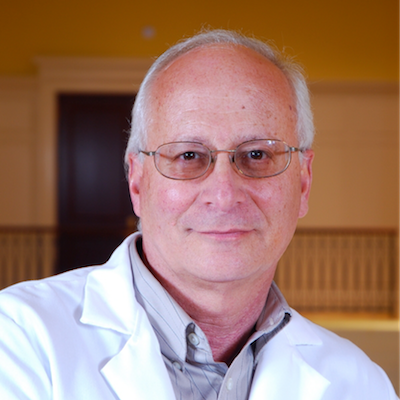steven_zeisel@unc.edu
704-250-5003
Steven H. Zeisel, MD, PhD
Professor Emeritus, Founding Director of the NRI
As the North Carolina Research Campus (NCRC) grows and more scientists and administrators move to Kannapolis, there is one face that has been here since the beginning. Founding NRI Director Steven Zeisel, MD, PhD, was a leader in this innovative venture before the first shovel hit the dirt. From the start, Zeisel was involved in building the dream of the NCRC, including its unique mission, novel approach to research, and distinguished team. Not only has he played an integral role alongside David H. Murdock in developing the vision of the Campus, he has also led the charge to seek scientific synergy between the best minds in nutrition research, through collaboration with the other NCRC organizations.
Under Zeisel’s leadership, this collaboration is the defining hallmark that will revolutionize the field of nutrition worldwide. Zeisel’s passion for the science of nutrition is evident throughout his distinguished career. He initially attended medical school at Harvard and completed his residency in pediatrics at Yale-New Haven Hospital. He earned his PhD in Nutrition from Massachusetts Institute of Technology in 1979.
After rising to the rank of professor at Boston University’s School of Medicine, Zeisel joined UNC-Chapel Hill’s faculty in 1990, becoming professor and chair of the UNC Department of Nutrition (the first department of nutrition in the country in both a school of public health and a medical school). In 1999, he was named Associate Dean of Research for the UNC School of Public Health. Later he began directing UNC’s Clinical Nutrition Research Unit (now called the UNC Nutrition Obesity Research Center). Subsequently, he was named a Kenan Distinguished University Professor of Nutrition & Pediatrics at the UNC Gillings School of Global Public Health and at the UNC School of Medicine in 2005.
Show MoreAs the North Carolina Research Campus (NCRC) grows and more scientists and administrators move to Kannapolis, there is one face that has been here since the beginning. Founding NRI Director Steven Zeisel, MD, PhD, was a leader in this innovative venture before the first shovel hit the dirt. From the start, Zeisel was involved in building the dream of the NCRC, including its unique mission, novel approach to research, and distinguished team. Not only has he played an integral role alongside David H. Murdock in developing the vision of the Campus, he has also led the charge to seek scientific synergy between the best minds in nutrition research, through collaboration with the other NCRC organizations.
Show MoreIn the News
Is Life Expectancy a Good Measure of Health?
October 27, 2015 • A recent, global study published in The Lancet (2015; 386, p.743-800) clearly emphasizes the importance of the latter referring to our quality of life. According to the Global Burden of Disease (GBD) study, worldwide life expectancy at birth rose by 6.2 years between 1990 and 2013. However, these additional years come at a price as healthy life expectancy at birth increased by only 5.4 years over the same 13 year time span.
Our Built-In “Antioxidant” System
October 1, 2015 • Antioxidants have been in the popular press for more than 20 years and, while many people may not understand what exactly antioxidants do, they have the right idea that consuming foods known to contain high levels of the compounds is better than not consuming them. In its simplest form, an antioxidant is a compound that can be consumed or that the body makes to defend against damaging effects of free radicals, highly reactive molecules that can damage cells and tissues. We are exposed to free radicals through everyday living.
New Study Shows How Phytochemicals Build Natural Defenses Against Free Radicals
September 21, 2015 • A new study from scientists at the NC Research Campus (NCRC) in Kannapolis, NC, found that certain phytochemicals build natural, cellular defenses against damaging free radicals and reactive oxygen species dispelling other popular theories of how some antioxidants work.
What rivalry? Duke, UNC collaborate at North Carolina Research Campus
August 24, 2015 • It took Dr. Summer Goodson nearly a year to find six men genetically qualified to participate in a sperm function study at the UNC Nutrition Research Institute (NRI) in Kannapolis. Male fertility is still a sensitive subject, said Goodson, a post-doctoral research associate at the NRI, making it tough to rely on traditional recruitment methods like fliers and advertisements. But after the NRI partnered with Duke University’s MURDOCK Study in Kannapolis, which has nearly 12,000 participants, Goodson needed only one day to identify 13 men who have the genetic variant she studies.
Publications
2020
2019
2018
2017
Contribution of Dietary Supplements to Nutritional Adequacy in Various Adult Age Groups.
Trimethylamine N-Oxide, the Microbiome, and Heart and Kidney Disease.
Reduced brain volume and impaired memory in betaine homocysteine S-methyltransferase knockout mice.
Astronaut ophthalmic syndrome.

